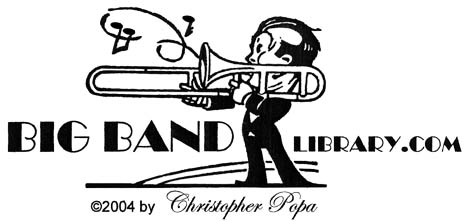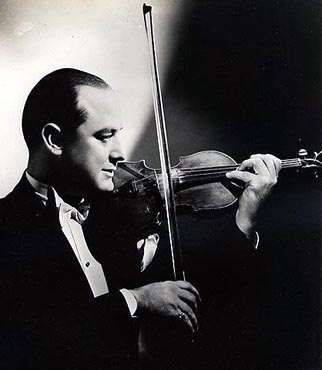
Did Venuti really get a piano pushed out of a hotel window and make a bet on what pitch it would sound when it hit the ground? When a saxophone player’s tapping foot bugged him, did he really nail the guy’s shoe to the bandstand? While on a live TV show sponsored by a hair cream, did Venuti show his bald spot and remark that’s what the product had done for him? Did he actually send Wingy Manone, the one-armed trumpeter, a single cuff link as a Christmas present one year?
Maybe - it’s hard to separate fact from fiction, and he frequently gave differing details when he re-told the stories.
What’s completely true is that Venuti was a genius at playing the violin.
vital stats:
given name Giuseppe Venuti
birth Dec. 3, 1894, Lecco, Italy? [ or Sept. 16, 1903, Philadelphia, PA? ]
death Aug. 14, 1978, Seattle, WA, lung cancer
heritage a family of sculptors (some of the men sculpted in graveyards; his grandfather
worked on bell towers)
father Giacommo Venuti, b.1863?, d.Feb. 11, 1952
mother Rosa LaMacchia Venuti
education public schools, Philadelphia, PA
first wife Sally
children six (including two who were adopted)
second wife Dorothy, m.1948?, div.Sept. 27, 1950
third wife an employee of Boeing
hobbies golf, fishing
memberships ASCAP, 1940-
residence Seattle, WA (1950s- )
Venuti took up the violin at the age of 4 - and was still practicing it for two hours a day while in his 80s.
One of his school classmates, guitarist Eddie Lang, became his first important and most compatible musical partner. They played together in the Scranton Sirens and with Jean Goldkette's Graystone Ballroom band.
Venuti later said that his father initially disapproved of his career path, that he considered
dance and jazz music “trash.”
In 1929, when Venuti joined Paul Whiteman’s orchestra, which was about to make the
motion picture, "King of Jazz," his salary skyrocketed.
“That changed my father,” Venuti recalled to writer Hollie I. West. “When I went home, I got the best parts of the chicken at dinner-the breast, leg. When I was a kid, I used to have to eat the neck, the feet. You know how Italian families are. The youngest kids ate last-and I was the youngest.”
Meanwhile, for about five years into 1933, Venuti made a number of recordings under his own name on the Okeh and Victor labels. The groups included, variously, Mannie Klein (trumpet), Tommy Dorsey, Glenn Miller, or Jack Teagarden (trombone), Jimmy Dorsey (clarinet and alto saxophone), Benny Goodman (clarinet), Bud Freeman (tenor saxophone), and Lennie Hayton (piano and celeste).
At an October 13, 1933 session for Bluebird, Venuti and orchestra recorded the tunes Fiddlesticks, Everybody Shuffle, and Phantom Rhapsody, with arrangements by Will Hudson.
The following year, he did a few more sides for Okeh, with Joe Haymes’ band. They were a second version of Fiddlesticks, plus By the Great Horn Spoon, Intoxication, and Goblin Market.
Other well-known musicians with whom Venuti was heard on recordings in the '30s were Louis Prima (trumpet and vocals), Russ Morgan (trombone), and Red Norvo (xylophone).
Joe Venuti in His Own Words:
“We just called it music with a beat; the word jazz itself was taboo.”
“Classical violinists don’t realize that people like me have something they don’t have: the
ability to improvise. All they can do is sit there and read the music.”
“My stupidity cost me one happy marriage. After I quit the booze, it took me a year to get
to understand people. Now I enjoy life a thousand times more.”
“Thank God my [ third ] wife understands me; she knows I can’t sit still. Music even helps
to cure my ulcers. Just pick up the violin and the pain goes away.”
In 1936, Venuti was elected to the DownBeat “All Time Swing Band.”
Compared to his acclaimed playing, Venuti's big band, which included young Barrett Deems on drums in 1939, was considered by most as merely adequate.
They did a couple of records for Decca on January 25, 1939 (the sides were titled,
humorously, Flip, Flop, Something, and Nothing), and performed at such locations as the Glass Hat Room of the Belmont Plaza Hotel in New York City and the Peabody Hotel in Memphis, TN.
Venuti re-organized on the West Coast in 1945, assembling a new big band which presented Kay Starr on vocals and played at, for example, the Hollywood Palladium and nearby at the Casino Gardens in Ocean Park, CA.
After he disbanded, Venuti worked on Bing Crosby's “Kraft Music Hall” radio show during
the late 1940s and early ‘50s.
During the last few decades of his life, Venuti headlined at various jazz festivals, clubs, and lounges in the U.S. and Europe and recorded prolifically, including an album of "Hot Sonatas" with Earl Hines for Chiaroscuro in 1975.
Venuti said that he particularly enjoyed teaching and performing with younger musicians, sometimes conducting clinics for them at colleges and towns across the country, and always outpacing others a fraction of age.
“It keeps me young,” he commented. “You’ve got to play. You’ve got to be active. And you’ve got to have laughs.”
That's no joke.
sources:
Mark Caputo, post to “Big Band Talk” forum, “Swingin’ Down the Lane with David Miller” /
bigband-era.com, Mar. 24, 2007.
Harriet Choice, “Jazz violinist Joe Venuti dies; recorded with greats,” Chicago Tribune,
Aug. 16, 1978, p.B6.
Leonard Feather, “Joe Venuti at 79- The Joker’s Still Wild,” Los Angeles Times,
Oct. 20, 1974, p.Q24.
---, “Venuti, Giuseppe (Joe),” in The Encyclopedia of Jazz (New York City: Horizon Press,
1955), pp.449-450.
Jean R. Hailey, “Joe Venuti, Grand Old Man of the Jazz Violin,” Washington Post,
Aug. 16, 1978, p.B6.
“Joe Venuti Used Horrible Words, Wife Charges,” Los Angeles Times, Sept. 28, 1950,
p.16.
“Joe Venuti’s Father Dead,” Los Angeles Times, Feb. 11, 1952, p.6.
Charles Leroux, “Joe Venuti: First violin of jazz,” Chicago Tribune, June 13, 1978, p.A1.
Tom Lord, The Jazz Discography, Volume 24: Sarah Vaughan to Barry Wedgle (West
Vancouver, British Columbia, Canada: Lord Music Reference, 2000), pp.V159-V176.
Bob Patry, “The Clown Prince of Jazz,” Mississippi Rag, Mar. 1992, p.1+.
Don Rayno, Paul Whiteman: Pioneer in American Music, Volume 1 1890-1930
(Lanham, MD: The Scarecrow Press, Inc., 2003), pp.370-371.
Brian Rust, "Joe Venuti," in Jazz Records 1897-1942, 5th Revised and Enlarged Edition:
Volume 2 Abe Lyman to Bob Zurke (Chigwell, Essex, England: Storyville Publications
and Co. Ltd., n.d.).
“Venuti, Joe,” in ASCAP Biographical Dictionary, Fourth Edition (New York City:
R.R. Bowker Company, 1980), p.520.
Hollie I. West, “The First Violinist of Jazz,” Washington Post, Sept. 21, 1977, p.D11.
John S. Wilson, “Joe Venuti Still Going Strong at 81,” New York Times, Apr. 14, 1978,
p.C28.
I would like to expand this tribute with, if possible, a new interview of someone who was important to Joe Venuti's life or career. Are you an alumnus of his band, a member of his family, or a collector who is knowledgeable about his accomplishments? Please contact me via e-mail
return to "Biographical Sketches" directory
go to Big Band Library homepage
The big bands are back
in a new and exciting way!
JOE VENUTI
"FIDDLESTICKS"
by Music Librarian CHRISTOPHER POPA
October 2008
He enjoyed making others laugh - telling tall tales, sharing wild escapades, and playing practical jokes.
A sideman with Jean Goldkette from 1924 to 1927, he went on to join Paul Whiteman's orchestra for a year beginning in May 1929.
Venuti launched his own big band in 1935.
According to critic-author Leonard Feather, “As Venuti, swallowed up by the emphasis on swing music, became one of a score of second-grade maestros playing one-night stands, his career as a jazz recording artist came to a halt while the legend of Venuti the incurable prankster outshadowed the reputation of the master musician.”
